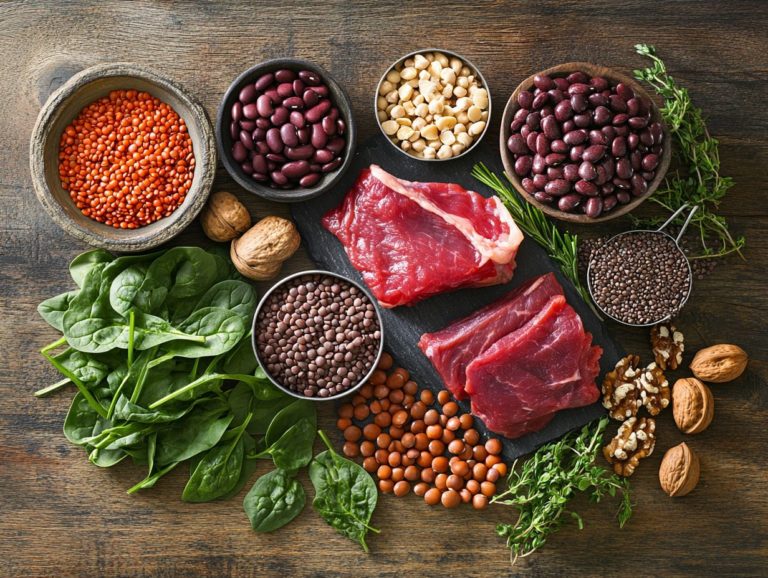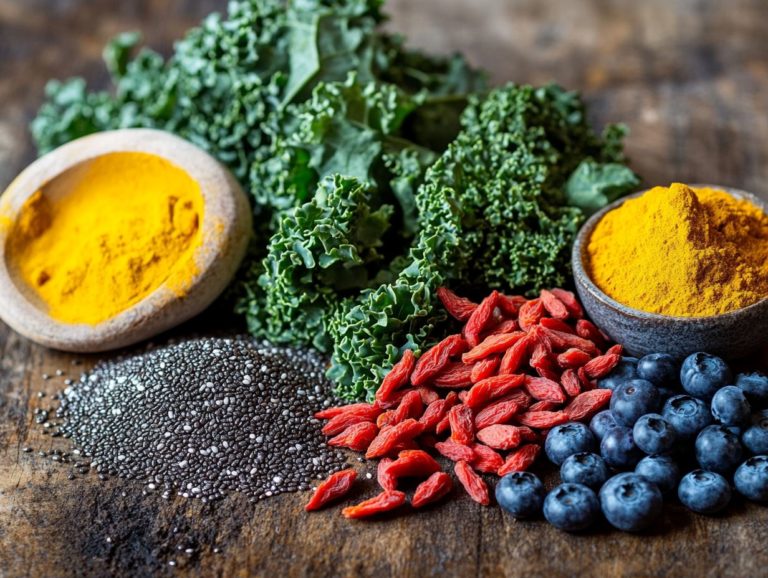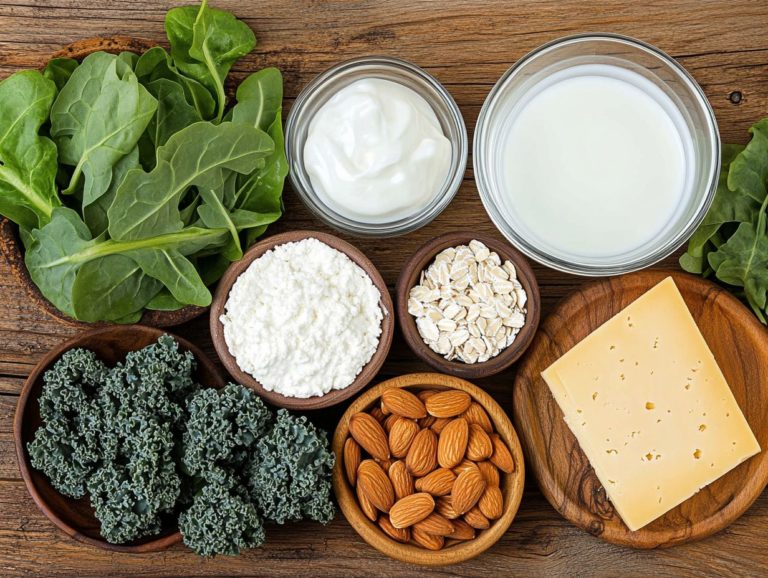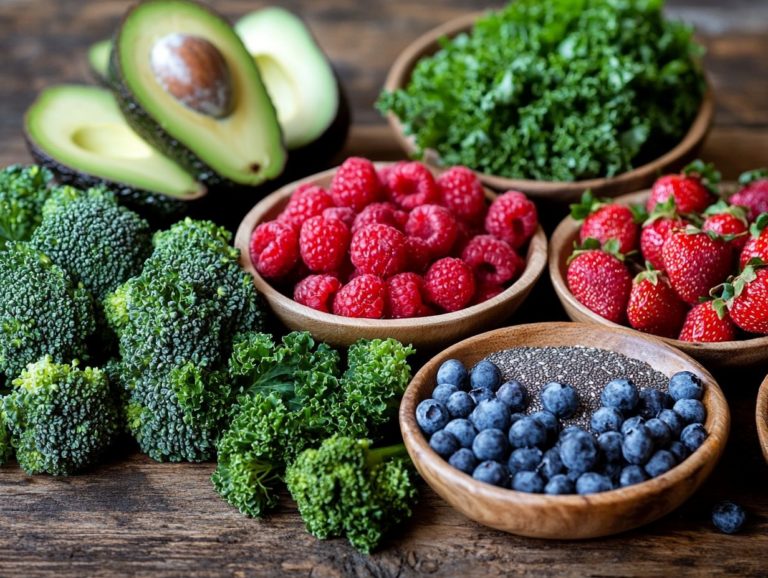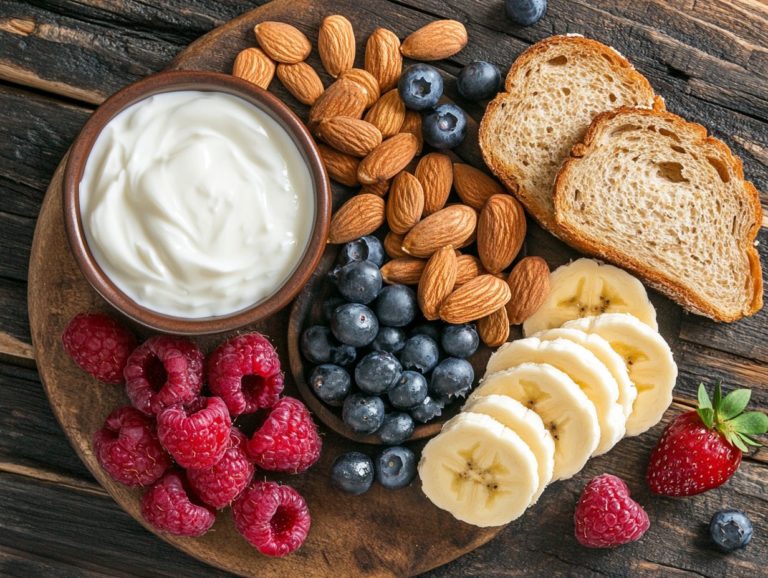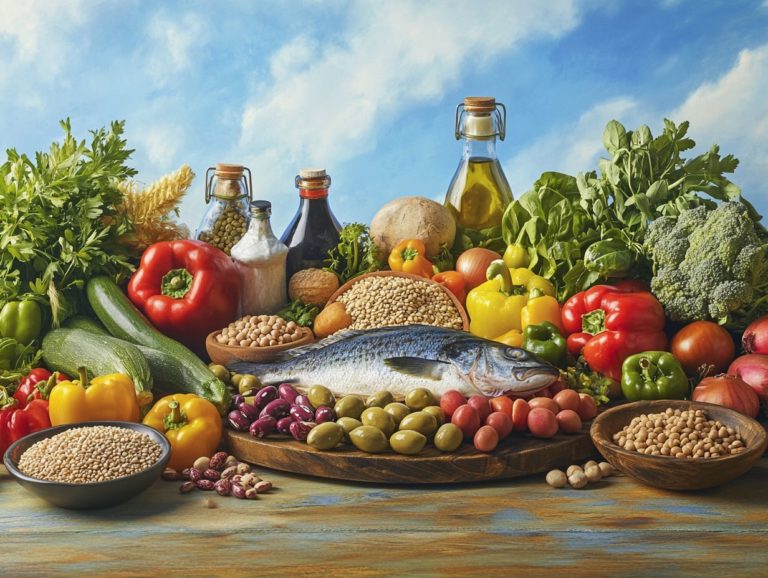Top 10 Protein Sources for a Balanced Diet
Protein is an important building block of your diet, playing a key role in muscle repair and supporting immune function.
With many sources available, finding the best options for your dietary needs can feel overwhelming.
Let s explore the top 10 protein sources, from lean meats and seafood to plant-based options like legumes and quinoa.
This article highlights the significance of protein, daily intake recommendations, and offers practical tips for incorporating these nutritious foods into your meals.
Get ready to discover delicious ways to boost your protein intake!
Contents
- Key Takeaways:
- 1. Lean Meats
- 2. Seafood
- 3. Eggs
- 4. Dairy Products
- 5. Legumes
- 6. Nuts and Seeds
- 7. Tofu and Soy Products
- 8. Quinoa
- 9. Greek Yogurt
- 10. Edamame
- What Is the Importance of Protein in a Balanced Diet?
- Frequently Asked Questions
- What are the top 10 protein sources for a balanced diet?
- Why is it important to include protein in a balanced diet?
- Can vegetarians and vegans get enough protein from their diet?
- How much protein should I consume in a day?
- Can I consume too much protein?
- Are there any plant-based protein sources that are considered complete proteins?
Key Takeaways:
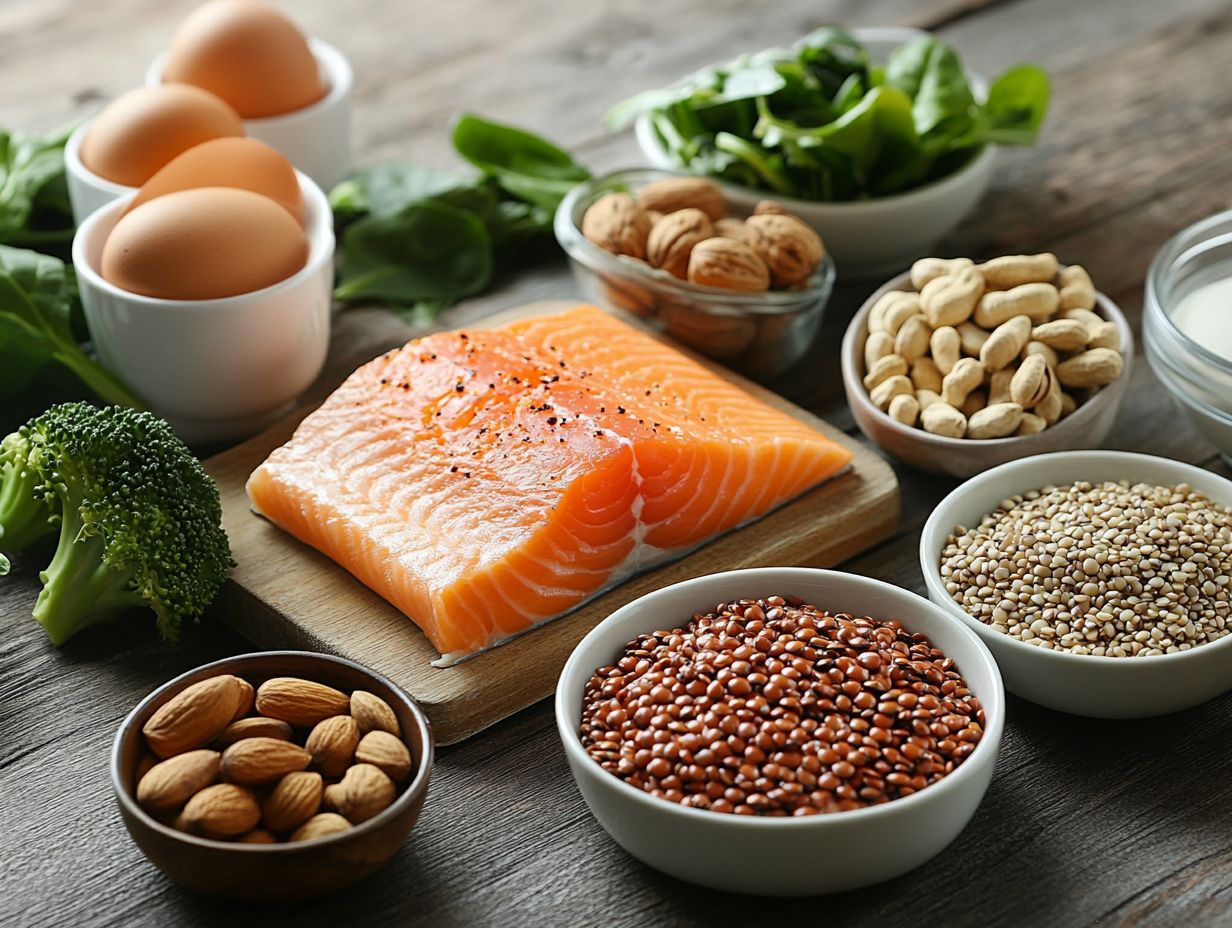
Incorporate lean meats, seafood, and eggs into your meals for a protein boost. Don t forget dairy, legumes, nuts, tofu, quinoa, Greek yogurt, and edamame for variety and health benefits!
1. Lean Meats
Lean meats, like chicken, turkey, and pork, are exceptional sources of high-quality protein. They play a significant role in your daily intake.
These meats provide essential amino acids, which are the building blocks of protein necessary for muscle recovery and overall health benefits.
A skinless chicken breast delivers around 26 grams of protein in a 3-ounce serving. Turkey breast offers about 25 grams, while pork tenderloin boasts nearly 22 grams.
These lean options have lower saturated fat than red meats and fit seamlessly into protein-focused diets aimed at muscle maintenance.
While animal protein is essential, it’s wise to monitor red meat consumption due to potential health risks, such as heart disease and certain cancers.
Balancing lean meats with other protein sources is key for a well-rounded, health-conscious diet.
2. Seafood
Seafood, including fish and shellfish, is an excellent source of high-quality protein.
It offers many health benefits, such as improved heart health and muscle recovery, due to its protein and omega-3 fatty acids.
With options like salmon, tuna, shrimp, and mussels, there’s something for every dietary preference.
Fatty fish, such as salmon and trout, provide high-quality protein and are rich in omega-3 fatty acids, which promote heart health and boost metabolism.
Omega-3s are vital for protein absorption, ensuring nutrients are used effectively.
Regularly including seafood in your diet can help you meet and exceed daily protein recommendations, making it a superb choice for enhancing overall health.
3. Eggs
Eggs are one of the most versatile and nutrient-dense protein sources available.
Each large egg offers about six grams of protein, making it an excellent choice for boosting your daily intake without adding excessive calories.
Incorporating eggs into a balanced diet can help you meet daily protein recommendations, especially if you engage in regular physical activity.
You can prepare eggs in various ways scrambled, poached, boiled, or baked into dishes like frittatas or omelets packed with vegetables.
This adaptability makes it easy to increase your nutrient intake.
Additionally, eggs provide not only high-quality animal protein but also essential nutrients like B vitamins, selenium, and choline that support overall health and energy levels.
4. Dairy Products
Dairy products like yogurt and milk are excellent sources of high-quality protein. They enhance how your body uses protein and deliver vital nutrients for maintaining optimal health.
Among the variety of dairy options, Greek yogurt truly shines with its impressive protein content providing nearly double the protein of regular yogurt. This makes it a fantastic choice if you’re aiming to elevate your protein intake.
Cheese is another excellent option; it packs concentrated protein along with healthy fats. Low-fat milk also offers a well-rounded source of protein and calcium.
For vegetarians, incorporating these dairy choices can effectively bridge nutritional gaps, allowing you to meet your needs without compromising your dietary preferences. Enjoying dairy-based smoothies or shakes can also serve as a delicious and convenient way to boost your protein levels!
5. Legumes
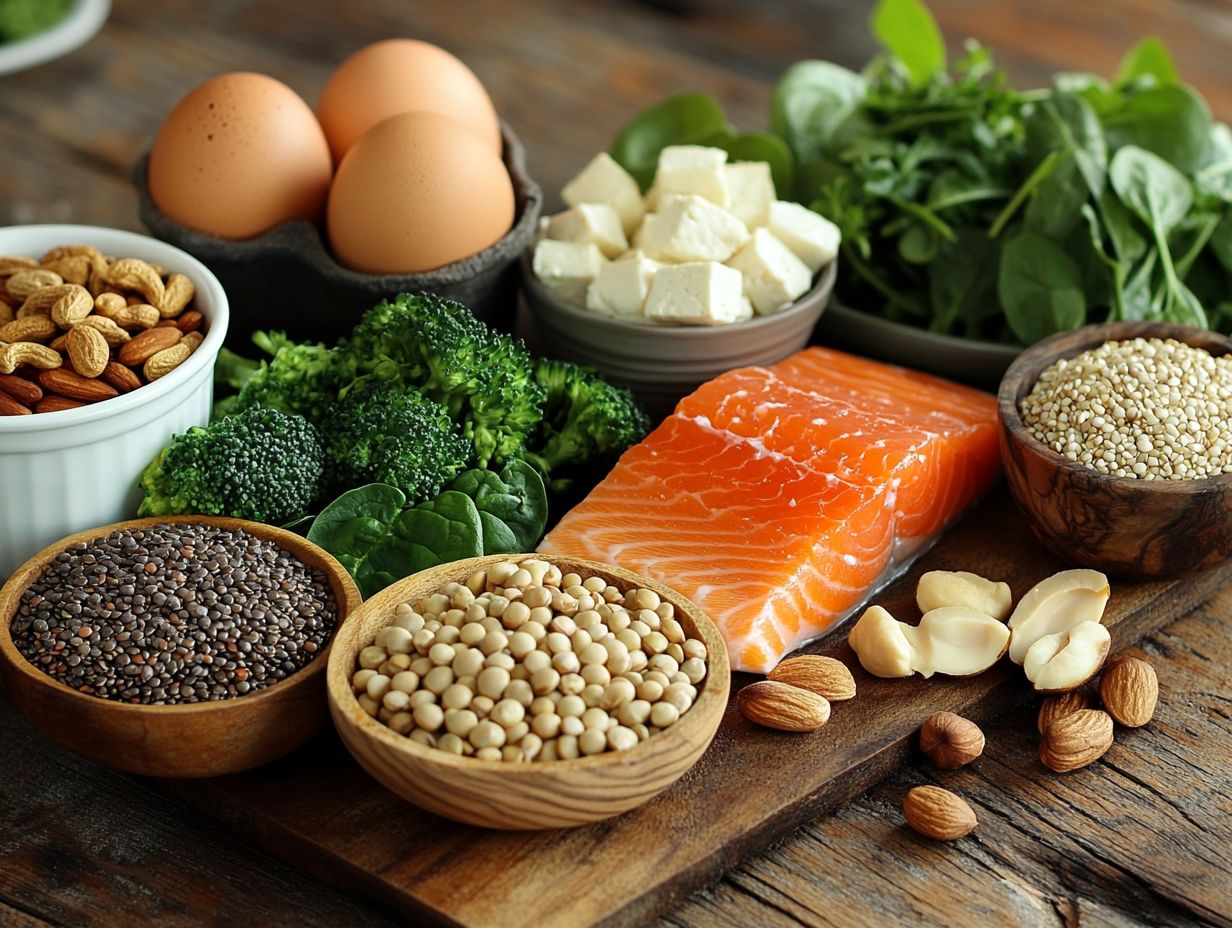
Legumes, including beans, lentils, and pulses, serve as exceptional sources of high-quality protein. For vegans and vegetarians, they provide a vital plant-based alternative that meets daily protein needs effortlessly.
These nutritious foods come in many forms, each offering its unique flavor and texture, making them incredibly versatile additions to countless dishes.
Take beans, for example; they are packed with fiber and can elevate everything from hearty stews to vibrant salads. Lentils, with their impressive protein-to-calorie ratio, cook up in a flash perfect for busy weeknight dinners.
Whether you’re whipping up a comforting lentil soup or a zesty bean chili, try adding these legumes to your meals for a tasty protein boost!
6. Nuts and Seeds
Nuts and seeds are not just delightful snacks; they are your go-to, high-protein options that help meet your protein needs while offering essential nutrients and healthy fats.
These small yet mighty foods come in various forms think almonds, walnuts, chia seeds, and pumpkin seeds all boasting impressive protein profiles. For instance, almonds provide about 6 grams of protein per ounce, while pumpkin seeds have an even higher count!
Incorporating these protein-packed snacks into your daily routine couldn t be easier. Toss a handful into salads, blend them into smoothies, or savor them as a mid-afternoon boost.
Beyond just protein, the healthy fats found in these foods support heart health and enhance nutrient absorption, making them a superb addition to your meal plan.
7. Tofu and Soy Products
Tofu and other soy products are not just delicious; they are also packed with high-quality protein. This makes them essential sources of plant protein for vegetarians and vegans alike.
A single serving of tofu offers approximately 15 grams of protein, making it a fantastic option for those aiming to meet their daily protein needs without relying solely on animal products. These soy-based choices provide essential amino acids, crucial for muscle repair and overall well-being.
For anyone following a plant-based diet, including tofu, tempeh, and edamame in your meals can effectively fulfill your protein requirements while also supplying nutrients like iron and calcium. Don t miss out on these protein-rich foods that can transform your diet!
8. Quinoa
Quinoa is often celebrated as a superfood. It is a complete source of high-quality, plant-based protein, offering all essential amino acids. This makes it an excellent choice for anyone eager to elevate their protein intake.
This grain is also packed with a wealth of vitamins and minerals, including magnesium, iron, and B vitamins. All of these contribute to a well-rounded and nourishing diet.
To seamlessly incorporate quinoa into your meals, consider:
- Adding it to salads for a delightful crunch.
- Using it as a base for vibrant grain bowls adorned with colorful vegetables and lean proteins.
- Swapping quinoa for rice or pasta in many recipes.
You can enjoy your favorite dishes while boosting your protein levels. Its versatility makes it effortless to weave into various cuisines, ensuring you maintain a balanced diet without compromising on flavor.
9. Greek Yogurt
Greek yogurt stands out in the dairy aisle. It boasts an exceptionally high protein content that enhances your protein absorption and serves as a versatile ingredient in many protein-rich meals and snacks.
This creamy delight packs nearly double the protein of regular yogurt. It is an ideal choice when you want to elevate your intake without piling on extra calories.
By incorporating it into your recipes, you not only boost the protein level but also introduce a delightful tang and luxurious texture. Whether you re using it as a base for smoothies, whipping up savory dips, or adding it as a decadent topping for fruit and granola, Greek yogurt seamlessly adapts to various culinary creations.
For fitness enthusiasts, Greek yogurt plays a crucial role in muscle recovery and helps you feel satisfied. It also contributes essential nutrients that support your active lifestyle and fitness goals.
10. Edamame
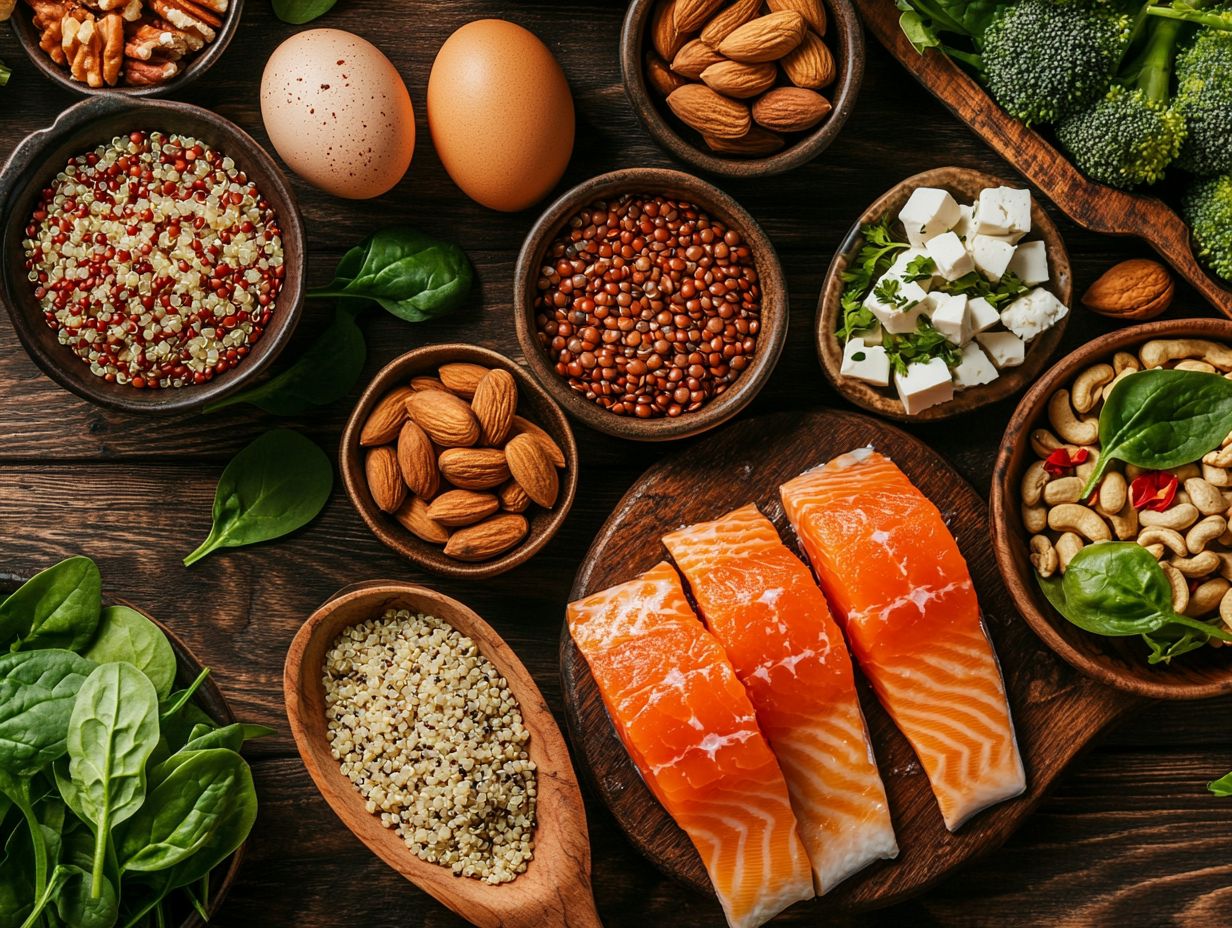
Edamame, those delightful young soybeans, are an exceptional source of high protein. They make a convenient, protein-packed snack for anyone embracing a vegan lifestyle. They offer essential nutrients that play a crucial role in muscle recovery and overall well-being.
Each vibrant green pod delivers about 17 grams of protein per cup. They are rich in vitamins and minerals like folate, iron, and magnesium. This nutritional powerhouse can seamlessly enhance a variety of meals, whether you’re topping salads, incorporating them into stir-fries, or simply enjoying them as a standalone snack.
If you’re looking to amplify your protein intake, edamame stands out as a delicious, plant-based alternative that not only satisfies hunger but also meets your nutrient needs. Its versatility allows you to incorporate it into smoothies or grain bowls, ensuring that you can relish its benefits in countless ways while maintaining a health-conscious approach.
What Is the Importance of Protein in a Balanced Diet?
Protein is essential to a balanced diet. It influences everything from muscle growth and recovery to metabolism and immune system function. Its importance truly cannot be overstated when it comes to your overall health and well-being.
Adequate protein intake is crucial, regardless of whether you’re an athlete aiming to build muscle, someone striving to maintain a healthy weight, or simply looking to enhance your immune response. This important nutrient is vital not only for repairing tissues but also for producing the enzymes and hormones that regulate your bodily functions.
Health experts generally recommend a daily intake of around 0.8 grams of protein for each kilogram of body weight, with adjustments based on your activity levels.
To elevate your protein consumption, consider incorporating foods like:
- Lean meats
- Beans
- Nuts
- Dairy products
These are simple yet effective strategies to ensure you re hitting your protein targets.
How Much Protein Should One Consume in a Day?
Determining your daily protein needs is essential for achieving your health goals. It s influenced by factors such as age, activity level, and overall well-being.
A common guideline suggests aiming for around 0.8 grams of protein per kilogram of body weight, but this is just a starting point.
If you exercise regularly, your protein needs increase. For those engaging in strength training, it s often recommended to consume about 1.2 to 2.0 grams per kilogram to effectively support muscle repair and growth.
Consider your specific objectives as well. If muscle gain is your aim, you might need to ramp up your intake even further.
Conversely, if you re focused on weight loss, a moderate increase can help promote fullness while preserving lean muscle mass.
For athletes, the demands are even more pronounced due to rigorous training schedules, and they may require specialized guidance to optimize their intake.
Vegetarians should be strategic with their protein sources, combining various plant-based proteins to ensure they consistently meet their daily targets.
What Are the Benefits of Consuming Protein?
Consuming adequate protein offers a wealth of benefits. It supports muscle health, promotes weight loss through enhanced metabolism, and plays a pivotal role in healthy aging.
Protein is a powerhouse in your diet!
Research shows that protein aids in muscle recovery after workouts, repairing tissue and fostering muscle growth. This ultimately boosts your strength and performance.
A study featured in the American Journal of Clinical Nutrition highlights protein’s role in weight management. It demonstrates how protein can enhance fullness and help reduce overall calorie intake.
As you age, preserving muscle mass becomes crucial for maintaining mobility and independence. Protein can help counteract the loss of muscle mass that comes with aging.
Fortunately, a variety of protein sources such as lean meats, legumes, and plant-based options offer the essential amino acids you need for these benefits. This makes it easier than ever to incorporate protein into your diet, no matter your dietary preferences.
How Can One Incorporate More Protein into Their Diet?
Incorporating more protein into your diet can be seamless. Choose protein-rich foods, experiment with high-protein recipes, and be mindful of your protein intake throughout the day.
Simple strategies can make a significant impact. For example, add a scoop of Greek yogurt to your smoothies or whip up a hearty chickpea salad to enhance the protein content of your meals.
For snacks, consider options like cottage cheese paired with pineapple or a handful of almonds both delicious choices that provide satisfying protein without piling on excessive calories.
Being aware of portion sizes is essential. A palm-sized piece of chicken or fish typically offers around 20-25 grams of protein, allowing you to effectively plan your protein distribution across meals.
Balancing these protein-rich foods with whole grains and healthy fats will ensure you enjoy a well-rounded diet that supports your overall health and energy levels.
What Are Some Common Misconceptions About Protein Sources?
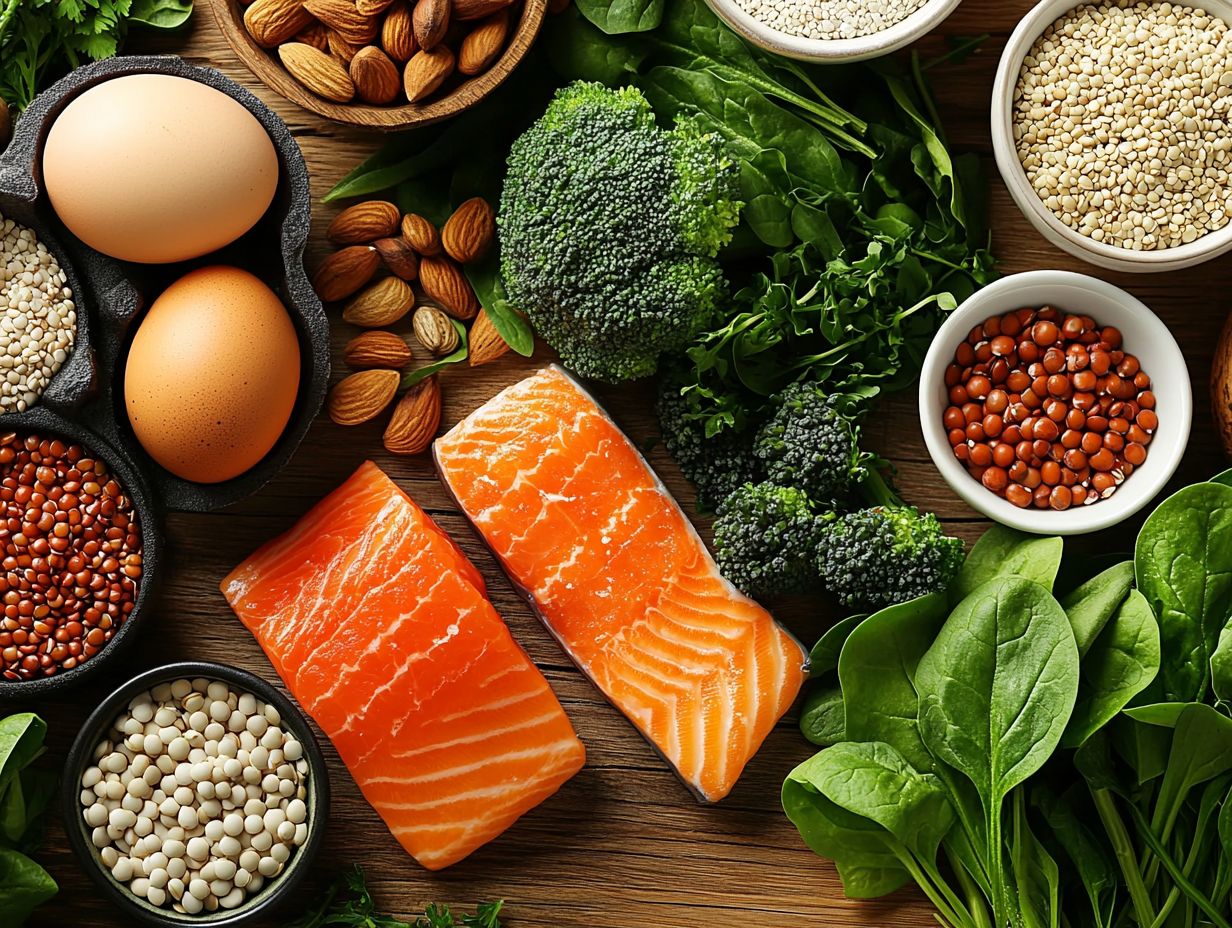
Numerous misconceptions surround protein sources, especially regarding the adequacy of plant-based options for vegetarians and vegans.
This often leads to confusion about how to meet daily protein needs and the potential health risks linked to consuming too much animal protein.
You might believe that it s impossible to achieve sufficient protein intake without animal products, but that s simply not true.
A thoughtfully planned diet rich in a variety of legumes, nuts, seeds, and whole grains can effortlessly meet your protein requirements.
In fact, balancing animal and plant proteins can yield a multitude of health benefits. Each source delivers unique amino acids and micronutrients essential for overall well-being.
By educating yourself about the full spectrum of protein sources, you can make informed choices that align with your health goals while honoring your dietary preferences.
Frequently Asked Questions
What are the top 10 protein sources for a balanced diet?
- Chicken
- Fish
- Beans and legumes
- Tofu
- Eggs
- Nuts and seeds
- Dairy products
- Quinoa
- Lean beef
- Edamame
Why is it important to include protein in a balanced diet?
Protein is essential for building and repairing tissues. It also helps maintain a healthy immune system and provides energy.
Moreover, protein is vital for preserving muscle mass and keeping you feeling full.
Can vegetarians and vegans get enough protein from their diet?
Yes, vegetarians and vegans can meet their protein needs. They should include beans, legumes, tofu, nuts, and seeds in their meals.
Eating a variety of these sources is crucial for sufficient protein intake.
How much protein should I consume in a day?
The recommended protein intake is 0.8 grams per kilogram of body weight. For example, someone weighing 150 pounds should aim for about 54 grams daily.
Can I consume too much protein?
Excessive protein can lead to weight gain and strain your kidneys. It s vital to consume protein in moderation and balance it with other nutrients.
Are there any plant-based protein sources that are considered complete proteins?
Yes, some plant-based sources are complete proteins. They contain all nine essential amino acids the body cannot produce.
Examples include quinoa, soy products, and buckwheat.

